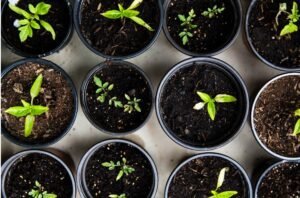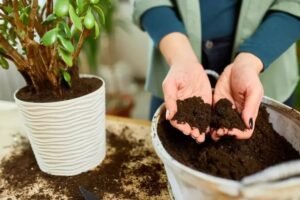I. Introduction
Houseplants not only add a touch of nature to our interiors, but they also have numerous benefits for our mental and physical health. One way to ensure that houseplants thrive in our homes is by using the right soil mix. To learn more about the best soil for houseplants and how it can affect their growth and health, visit https://housebouse.com.
A. Brief Overview Of The Importance Of Houseplants In Indoor Spaces
Houseplants have emerged as more than just trendy decor elements; they are essential contributors to a healthy indoor environment. As urbanization continues, people spend a significant amount of time indoors, and the quality of the air we breathe in these enclosed spaces becomes paramount. Houseplants not only add a touch of nature to our homes but also serve as natural air purifiers, filtering out pollutants and enhancing overall air quality.
Moreover, the aesthetic appeal of houseplants is undeniable. They bring a refreshing touch of greenery, creating a connection with the outdoors that can be both soothing and invigorating. Whether you’re a seasoned plant enthusiast or just starting to explore the world of indoor gardening, understanding the connection between enriched soil and healthy houseplant is crucial for cultivating a thriving indoor garden.
B. Connection Between Enriched Soil And Healthy Plant Growth
The foundation of any successful indoor garden lies in the soil. Enriched soil provides the necessary nutrients for plants to thrive, fostering healthy growth and vibrant foliage. When it comes to houseplants, the choice of soil becomes a critical factor in determining their overall well-being.
In enriched soil, houseplants find a rich source of essential nutrients like nitrogen, phosphorus, and potassium. These nutrients contribute to robust root development, strong stems, and lush leaves. Furthermore, enriched soil promotes better water retention, preventing overwatering or underwatering—common pitfalls for indoor gardeners.
Choosing the right soil mix for your houseplants involves understanding the specific needs of each type of plant. Some houseplants thrive in well-draining soil, while others prefer a more moisture-retentive mix. Highlighting the connection between enriched soil and healthy growth not only educates your audience but also positions your content as a valuable resource for both novice and experienced indoor gardeners.
II. Understanding Enriched Soil
A. Definition And Components Of Enriched Soil
Enriched soil, also known as nutrient-rich soil, is a specialized blend designed to provide optimal conditions for plant growth. Unlike regular soil, enriched soil is fortified with additional nutrients that cater to the specific needs of plants. The key components of enriched soil include organic matter, minerals, and microorganisms. This potent combination creates a fertile environment that encourages robust root development and overall plant health.
In enriched soil, organic matter plays a crucial role in enhancing soil structure and water retention. Composed of decomposed plant and animal material, organic matter contributes to the soil’s fertility by releasing essential nutrients over time. This dynamic composition sets enriched soil apart, making it an ideal medium for nurturing houseplants.
B. Role Of Nutrients In Promoting Plant Growth
The success of houseplants hinges on the availability of essential nutrients within the soil. Enriched soil typically contains a balanced mix of nitrogen, phosphorus, and potassium – often referred to as N-P-K. These nutrients are vital for various aspects of plant development.
Nitrogen (N): Essential for leaf and stem growth, nitrogen promotes lush foliage, ensuring that houseplants achieve a vibrant and healthy appearance.
Phosphorus (P): Crucial for root development and flower formation, phosphorus supports overall plant structure and reproductive processes.
Potassium (K): Playing a role in disease resistance and overall plant vigor, potassium contributes to the overall resilience of houseplants.
These nutrients work in harmony to create an optimal environment for houseplants to flourish, providing a balanced diet that mirrors the conditions they would encounter in their natural habitats.
C. How Enriched Soil Differs From Regular Soil
Enriched soil stands out from regular soil due to its tailored composition. While regular soil may lack the necessary nutrients for sustained plant growth, enriched soil is formulated to provide a complete and nourishing environment. Regular soil may also suffer from poor structure, leading to issues like compaction or inadequate drainage, which can be detrimental to plant health. Enriched soil addresses these concerns, offering a well-balanced and nutrient-dense foundation for houseplants to thrive.
The distinction between enriched and regular soil is particularly crucial for indoor gardening, where plants rely solely on the provided soil for nutrients. By understanding the unique qualities of enriched soil, indoor gardeners can make informed decisions that contribute to the overall well-being of their houseplants.

III. Selecting The Right Enriched Soil
A. Analyzing The Specific Needs Of Houseplants
When selecting enriched soil for houseplants, it’s essential to consider the specific requirements of each plant species. Different houseplants have varying preferences for soil composition, drainage, and moisture levels. Researching the individual needs of your plants ensures that you choose an enriched soil mix tailored to their requirements, fostering optimal growth and vitality.
B. Importance Of Organic Matter In Enriched Soil
Organic matter is a key component of enriched soil, and its importance cannot be overstated. It not only contributes essential nutrients but also improves soil structure, aeration, and water retention. The organic matter in enriched soil acts as a reservoir for nutrients, gradually releasing them to the plants as needed. This ensures a steady and sustained supply of nourishment, promoting long-term health and resilience in houseplants.
IV. Nurturing Healthy Houseplant Growth
A. Proper Watering Techniques
Watering is a fundamental aspect of nurturing healthy plant growth, and mastering this art is crucial for maintaining a thriving indoor garden. Overwatering or underwatering can lead to stress, root rot, and overall decline in plant health. To strike the right balance, it’s essential to understand the specific moisture needs of each houseplant.
Start by checking the moisture level in the soil regularly. Insert your finger into the soil up to the first knuckle – if it feels dry, it’s time to water. Ensure that water drains freely from the pot to prevent waterlogged conditions. This is where the enriched soil plays a vital role, offering optimal drainage and moisture retention. Coupled with the right watering schedule, enriched soil creates an environment where houseplants can absorb water efficiently without the risk of drowning their roots.
B. Adequate Sunlight Exposure
Sunlight is the lifeblood of plants, driving the process of photosynthesis essential for their growth. Adequate sunlight exposure is a non-negotiable factor in nurturing healthy growth. Different plants have varying light requirements, so understanding the specific needs of your houseplants is essential.
Place sun-loving plants near windows that receive ample sunlight throughout the day, while shade-tolerant varieties can thrive in corners with filtered or indirect light. Enriched soil, with its nutrient-rich composition, complements sunlight exposure by providing the necessary foundation for robust growth. It ensures that plants can maximize the benefits of sunlight, promoting lush foliage and vibrant blooms.

V. Conclusion
Greening indoor spaces goes beyond aesthetics – it contributes to our well-being, improving air quality, reducing stress, and enhancing the overall ambiance of our homes. By incorporating enriched soil and adopting proper care techniques, you’re not just nurturing houseplants; you’re cultivating a healthier and more vibrant indoor environment. The investment in enriched soil of houseplant growth is an investment in the long-term benefits of transforming your living spaces into havens of natural beauty and well-being. For helpful tips and resources on how to create your own indoor oasis, visit us.
Frequently Asked Questions (FAQ)
Q: Why is enriched soil important for plant growth?
Enriched soil provides essential nutrients and promotes a healthy microbial environment, fostering optimal conditions for houseplants to thrive indoors.
Q: How does enriched soil differ from regular soil?
Enriched soil is specifically formulated with added nutrients, organic matter, and often perlite or vermiculite, offering a superior growth medium compared to standard garden soil.
Q: What nutrients should I look for in enriched soil for houseplants?
Key nutrients include nitrogen, phosphorus, potassium, and micronutrients like iron and magnesium. Check labels for a balanced blend to support overall plant health.
Q: Can I make my own enriched soil at home?
Yes, you can create enriched soil by combining quality potting mix with organic matter such as compost, well-rotted manure, and additional amendments like perlite or coconut coir.
Q: How often should I water houseplants growing in enriched soil?
The watering frequency depends on the specific plant’s needs, but enriched soil generally retains moisture well. Water when the top inch of the soil feels dry, and ensure proper drainage.

